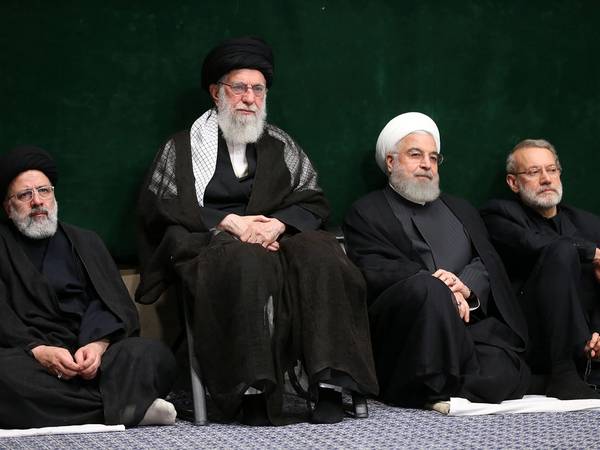Discussions persist in Iran over the contentious ban imposed by regime hardliners preventing former President Hassan Rouhani from running in the March 1 elections.
Rouhani’s disqualification is primarily attributed by local media to his perceived low performance during his presidency, the complete removal of the reformists from the political arena by the authoritarian camp, and the regime’s preference for minimal electoral participation.
However, these explanations do not fully address the core reason behind his disqualification. To comprehend this story on a broader scale, one must consider three key realities unfolding at the pinnacle of the power structure within Iran's Islamic Republic:
First, Ali Khamenei, who is currently 84 years old, has undergone significant health issues, including a surgery a decade ago. Over the past ten years, observers have witnessed a noticeable decline in his physical and mental faculties during his televised speeches. The Leader's office and the commanders of the Islamic Revolutionary Guard Corps (IRGC) cannot afford to be indifferent to the question of succession. Additionally, during the later stages of leadership in dictatorial regimes, as was evident in the final years of Ayatollah Khomeini's rule, influential figures within the system tend to play a more pivotal role in determining the future leader.
Second, over the past decade, there have been four significant and somewhat unpredictable disqualifications in Iran. These include the disqualification of Akbar Hashemi Rafsanjani for the presidency in 2013, Hassan Khomeini's exclusion from the Experts Assembly membership in 2015, Ali Larijani's disqualification for the presidency in 2021, and now Hassan Rouhani's disqualification from the Experts Assembly membership. These figures hold influential positions and have the potential to impact various aspects of the establishment, including the issue of succession. Their disqualification effectively marginalizes them and removes them from the political landscape.
Third, Both Hassan Khomeini and Sadegh Larijani emerged as serious contenders for leadership positions over the past decade, owing to their age, political profiles, and positions within the seminary. Hassan Khomeini, the grandson of the Islamic Republic's founder, currently teaches advanced jurisprudence courses and represents the reformist camp's candidate for the leadership role. Sadeq Larijani, the son of Mirza Hashem Amoli (a prominent Shia source of emulation) and the son-in-law of Vahid Khorasani (a high-ranking Shia authority in Qom Seminary), held influential positions within the traditionalist Islamist camp.
Nevertheless, individuals loyal to the Supreme Leader have sought to obstruct the ascent of these two figures over the past decade. Hassan Khomeini, in particular, has faced verbal attacks from Basij members and government insiders during official ceremonies, especially on the anniversary of his grandfather's death. Khamenei's supporters have accused him and his family of leading an aristocratic lifestyle. His disqualification has dashed the hopes of his followers to influence the Experts Assembly after Ali Khamenei's eventual passing.
Sadeq Larijani was abruptly removed from his position as head of the judiciary in 2021, prior to the end of his usual ten-year term. A high-profile corruption case involving one of his deputies was publicized at that time. Furthermore, he was ousted from the Guardian Council. Mohammad Yazdi, the head of the Qom's Instructors Association, publicly criticized Larijani for establishing an opulent office in Qom. Presently, he heads the Expediency Council but is largely sidelined by other institutions.
The perception of Ali Khamenei's impending demise has led to the elimination of potential rivals to Mojtaba Khamenei, his son and likely successor. Those who could have played a significant role in the Experts Assembly after Khamenei's demise have been sidelined. The establishment seeks individuals who will align with Mojtaba's vision and ensure a smooth transition to the throne, unopposed.
The existence of single-candidate elections, such as those in South Khorasan province during this term, where Ebrahim Raisi was the sole nominee, and numerous single-candidate elections in the past, underscores the process of reserving Experts Assembly seats for those loyal to Khamenei, his office, and the IRGC's intended successor.
Leadership succession within the Islamic Republic holds immense significance for the ruling elite, as it is a matter they cannot leave to chance. Over the past decade, they have carefully engineered individuals and institutions that could play a role in determining the future leader. The fate of the Islamic Revolutionary Guard Corps, the regime's expansionist agenda, and the future of the Shia clergy, invested in for five decades, hinge on the identity of the future leader. Trillions of dollars, either plundered or yet to be gained, hang in the balance.
